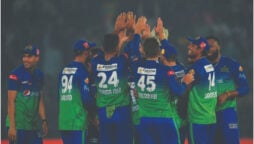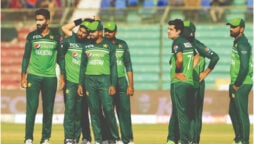
Who Rules the World
If Pakistan lift the World Cup today, Babar Azam and the lads will lift not just a trophy but a nation
Thirty years ago what is now an iconic song by Kasey Carlone first reverberated through our minds as the 1992 ODI World Cup in Australia progressed through to the final across some four weeks. The words are etched in our minds and hearts still:
The World Is Coming Down
The Flags are Up
Who’s Gonna Be Number One
Who’s Gonna Take Out The Cup
Who’ll Be
Who’ll Be the King
It’s Once In A Life Time Chance
Who’ll Rule the World
Gotta see who’ll rule the world
That theme song has an infinite life it seems and this Sunday, the day of the final of the T20 World Cup in the same country, has an underlying question that brings out the essence of the competition. And that is that you never know.
I mean think about it. The Netherlands needed to beat South Africa for Pakistan to have a shot. Beat South Africa, the side that had one of the most devastating batting orders and one of the best pace attacks, leaving aside that Pakistan had beaten them comprehensively a couple of days earlier.
The Proteas had after all beaten the world’s best-ranked T20 side, India, give or take the suspicious misses the Indian fielders gifted them.
Yes, the Pakistanis themselves made a heavy meal of overcoming the Bangladesh side. But their clinical batting performance in the semifinal to overcome what was a defendable total is commendable, given how poorly the top order had performed until the ebullient Haris stepped in against the Proteas.
Even then, in that match with Pakistan 43-4 trying to set a decent target, the Green Shirts clocked a 3% chance of making it to the semifinals as per the official predictor at the time with all its algorithms.
That is why it is said that Pakistan breaks all rational rules of predictions, perhaps due to the power of the prayers that seem to bring them back from doom to bloom.
Pakistan have made the act of survival followed by dominance an art form. Yes, doesn’t always work but when it does, it blows the mind.
So many similarities are being drawn to how we progressed to the final of the 1992 World Cup: losing the first game also at MCG, losing to India, winning the last three games, needing another team to beat another on the last day of the group games, meeting and beating the top performing team — yes, it was New Zealand then too — in the semifinal and now meeting England in the final again at Melbourne.
In fact, every time Pakistan has won an ICC tournament, they have had a horrid run-up to the last dash and then gone on to win the trophy.
After that 1992 false start, there was 2009. Pakistan lost heavily to England in their group game comprising three teams and then started their four-team group in Super Eights losing heavily to Sri Lanka.

They then needed to win all their remaining games to make it to the last four. The next day they played New Zealand who climbed to 33-1 in 4 overs when Umar Gul struck and Pakistan skittled the Kiwis with 5 for 6 in three overs to make it easy for the batters. But again New Zealand needed to lose to Sri Lanka and they did. Pakistan went on to beat South Africa in the semis and Sri Lanka in the final.
Take the 2017 Champions Trophy. Ranked eighth in the ICC ODI rankings having just scraped through into the 8-team tournament, they started by losing by over 100 runs to India in their opening game.
Then, of all the teams, they closely beat South Africa, the top-ranked team and eventually needing to beat Sri Lanka to enter the semifinal, were at one stage 162-7 in the 30th over chasing 236.
With the score at 194, Thisara Perera dropped a simple floater from Sarfaraz Ahmed at mid-on and Pakistan were through to the semifinals a few overs later, beating England easily in the last-four and then that memorable final victory coming against favourites India.
As someone said, Pakistan are most dangerous when they are written off and go out meekly when they are favourites entering a tournament. And though they were not the title favourites here but Pakistan were always expected to make it to the last four, either at the expense of India or South Africa until they made a hash of it against Zimbabwe and did a massive hiccup.
This is why the ease with which they won the semifinal has been astonishing and yet not surprising given their history of rebirths.
And especially when the much-mocked opening pair of Babar Azam and Mohammad Rizwan were the ones who defied all expectations and batted with a debonair touch to seal the deal so to say.
That doesn’t mean the criticism wasn’t justified for had it not been for the Netherlands putting in a miracle and later a much-maligned middle-order rising in the game against Bangladesh, they would have been in Pakistan earlier this week than in Melbourne today.
Just that both batted the way all critics and sages of the game were telling them to bat. Much is being made of Matthew Hayden’s ominous warning that Babar will return but what else would a batting mentor have said before a crunch game to raise morale?
And had Devon Conway held him behind the stumps off his first ball, the criticisms of his approach would have been justified as I’m sure they have been over the course of the past few weeks.
One innings does not erase a string of probing and prodding and dot balls consumed in the process. The same applies to Rizwan.
As recent as the game against Bangladesh, the pair batted at less than six in the powerplay and Pakistan lost wickets later under pressure to step up.
It was Haris who swayed the game back Pakistan’s way as the think tank again held back Shadab Khan, the man who had clobbered the South Africans and lifted Pakistan from a losing position.
Still, we must celebrate the return to sanity by the two openers. Whether it was the realization that Pakistan needed them to bat aggressively to avoid the quicksand they had found themselves in against Zimbabwe and Bangladesh when chasing an even lower target or whether they became cognizant of the fact that if they mucked up the run rate here and Pakistan lost, they might just lose their places, doesn’t matter. Pakistan won in the end when another 10 dot balls in the powerplay could have proved the difference.
Can I also say here that everyone from fans to critics to analysts have become so obsessed with the Babar-Rizwan combo and all its repercussions and implications that so little time and space is attributed to our bowlers.
Time and again it has been them who have brought Pakistan back into the game. Even against India if you take away Kohli’s genius the bowlers had left them needing 16 an over going into the last three.
They restricted Zimbabwe and Bangladesh to under 130, the Netherlands to under 100 and reduced the pulverizing South African top and middle order to 108-9 in a rain-shortened game.
Here in the semifinal, they not just cut out the big guns Finn Allen, Conway and Glenn Philips before New Zealand reached fifty and constrained them to 152 when they had stormed to 200 against Australia on this very pitch. To top it off, they bowled not a single wide or no ball in that contest.
The Pakistani bowling attack had the best economy rate (6.34) among all teams going into the knockouts. Shaheen Afridi has made inroads despite not being fully fit and at his swinging best, Shadab has been almost unhittable, Haris Rauf despite two poor outings holds his own, Mohammad Wasim has posed the question repeatedly why he wasn’t played from the first game, Naseem Shah has been bowling slower but more accurately, Iftikhar has had his day and even Nawaz made a comeback against New Zealand.
Excitingly, despite a poor outfield show against Zimbabwe, they remain in the top three of success ratio in fielding.
That needs a mention too rather than the resurgence of Babar and Rizwan after a string of low runs and high dot balls over the past dozen games or so.
So which Pakistan will turn up today for the final? I have a feeling it will be the more confident, more consistent, the more tactical and more aggressive Pakistan, just as they were in the semifinal.
Whenever Pakistan have come back from near elimination at the group stage they have gone all the way. I also feel the Pakistani bowlers can rein in England’s batters.
Not just because we won three of the seven matches against them in September where we defended low scores, but because the Pakistani pace and spin attack is superior to India’s and has gauged the weaknesses of the England batters over that series.

Buttler and Hales may have mauled the Indian bowling attack at Adelaide but a whole lot of those runs came square of the wicket with the 60-meter boundary, the ground being oval-shaped.
Also, the Indians bowled without much heart. There were also fewer wicket-taking balls bowled; hardly any ball swung or spun. At the large and round-shaped MCG and with Pakistan’s pacemen and spinners both more probing and aggressive, run-making may not come as easy as at Adelaide.
Pakistan’s batting may admittedly come under pressure and if they bat first anything less than 170 will cause them nervous moments when defending.
What Pakistan must do is take full advantage of the powerplay and hit the top of the inner circle with power as the boundaries are between 70-80 meters at the MCG. After that go as much for two and threes especially if a couple of wickets fall after the powerplay.
It’s a huge ground with plenty of empty spaces to target. Pakistan should not fall for skied shots after the powerplay as they did against India in their opening game. If you want 10 to 11 an over they can get that at the MCG by running between wickets.
Pakistan has fantastic talent and where they have erred recently is more due to conservative and contradictory selection, unimaginative tactics and a defensive approach during the powerplay.
What is most pleasing about this side is that there is so much intrinsic optimism and so much bonhomie among the players. They back each other on and off the field and their body language remains positive under stress. That characteristic will be most needed today.
It’s been a great week with Pakistan coming to the medals stand in hockey after so many years and winning the World Polo Championship.
The Pakistani women cricketers have cleanly swept the Irish women and if InshAllah Pakistan lift the World Cup today, Babar Azam and the lads will lift not just a trophy but a nation.
Sohaib Alvi has been covering cricket at home and abroad for over 40 years as columnist, editor, analyst, TV expert/host. An MBA from IBA he has simultaneously had a 35-year career in the corporate sector, having worked in C-Suite positions. He now advises clients on leadership, business strategy, marketing and organizational planning.
Catch all the Champion News, Breaking News Event and Latest News Updates on The BOL News
Download The BOL News App to get the Daily News Update & Live News.












 Read the complete story text.
Read the complete story text. Listen to audio of the story.
Listen to audio of the story.